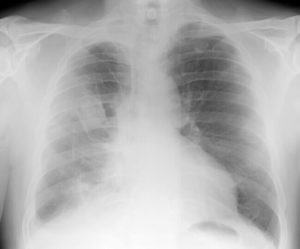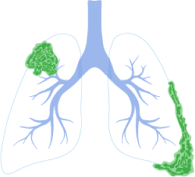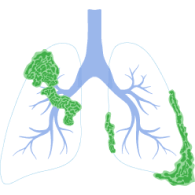Mesothelioma
Malignant mesothelioma is a rare form of cancer that develops in the mesothelium, a layer of tissue inside the body, after asbestos exposure. Mesothelioma cancer tumors can appear in the lining of the lungs, abdomen, heart, or testicles. Though this cancer is aggressive, you can live longer with medical care. Lung Cancer Group can help you find top doctors who treat mesothelioma and get compensation to cover any of your expenses.
What Is Mesothelioma?
 Mesothelioma is a cancer caused by asbestos. It develops in the lining of major organs, including the lungs, abdomen, heart, or testicles.
Mesothelioma is a cancer caused by asbestos. It develops in the lining of major organs, including the lungs, abdomen, heart, or testicles.
Patients typically develop mesothelioma symptoms like chest pain and shortness of breath 10-50 years after exposure to asbestos fibers.
Mesothelioma is aggressive, but long-term survival could be possible by getting treatments like surgery, chemotherapy, and radiation from top cancer doctors.
Quick Facts About Mesothelioma
- Around 3,000 new cases of mesothelioma are diagnosed every year.
- Mesothelioma patients live for 12-21 months on average, with some living 15 years or more with the right treatments.
- U.S. veterans account for 1 in 3 mesothelioma patients.
- Manufacturers hid the health risks of asbestos for decades. Filing a legal claim with them can typically result in compensation of $1 million or more.
Lung Cancer Group is ready to help if you or a loved one have mesothelioma. We can connect you with top doctors and treatments, answer any of your questions, and pursue financial compensation on your behalf.
Get started by speaking with our registered mesothelioma nurses right now.
- Find Top Doctors and Treatments
- Connect You With Clinical Trials
- Answer Medical Questions

Amy Fair
20+ Years Helping
Mesothelioma Patients
Mesothelioma vs. Lung Cancer
Both lung cancer and mesothelioma can be caused by asbestos exposure. Malignant mesothelioma is sometimes mistaken for lung cancer, but the two conditions aren’t the same.
Mesothelioma forms in the lining of different organs, including the lungs or abdomen. Lung cancer develops in the lung itself.
Further, lung cancer might also be caused by smoking, radon exposure, and many other factors. Only asbestos exposure causes mesothelioma.
The good news is our team may be able to help you whether you have lung cancer or mesothelioma. Call (877) 446-5767 now to learn more about your options.
Mesothelioma Symptoms
Mesothelioma symptoms typically appear 10-50 years after asbestos exposure. The most common mesothelioma symptoms include chest pain, a cough that won’t go away, and shortness of breath.
- Abdominal pain
- Appetite loss
- Blood clots
- Cough (or coughing up blood)
- Difficulty breathing
- Fever
- Fatigue
- Unexplained weight loss
Symptoms can vary depending on where the cancer develops. For example, pleural mesothelioma affects the lung lining, so patients with this cancer may experience pleural effusions (buildups of fluid in the lung lining) that cause breathing issues and chest pain.
See a doctor immediately if you have any possible mesothelioma symptoms and were exposed to asbestos decades ago.
Getting symptoms of mesothelioma diagnosed early is crucial. You might be able to catch the cancer before it spreads, meaning it’ll be easier to treat and you may live longer.
Mesothelioma Causes
The only known cause of mesothelioma is asbestos exposure.
“If there’s no asbestos, there’s no mesothelioma. It’s that simple. If you have mesothelioma, and you say, ‘Well, I’ve never been exposed to asbestos,’ you were exposed to it. You just don’t know where or you don’t know when.”
— Dr. Raja Flores, mesothelioma doctor
Here’s how asbestos exposure leads to mesothelioma:
- If a product made with asbestos wears out, breaks down, or gets disturbed, asbestos fibers can be released into the air.
- Once in the air, the fibers can be breathed in or swallowed without noticing.
- The fibers can get stuck in the linings of major organs and irritate healthy tissues and cells for decades.
- After 10-50 years, this irritation can cause healthy cells to mutate into mesothelioma cells.
Manufacturers of asbestos-containing products knew that asbestos exposure could cause serious illnesses back in the 1930s. However, these companies hid the dangers from the general public to keep their profits up.
By the time the risks became public knowledge in the early 1980s, millions of people had been exposed to asbestos. Since the cancer takes decades to develop after exposure, thousands are diagnosed every year — even though the use of asbestos has been heavily restricted.
Who Is at Risk of Mesothelioma?
Anyone with a history of asbestos exposure is at risk of developing mesothelioma. Those who were exposed on a daily basis are more likely to get sick.
Most people develop mesothelioma due to occupational asbestos exposure, according to the Mesothelioma Applied Research Foundation. This is because asbestos-containing products were commonly used in blue-collar industries and the military.
- Boilermakers
- Construction workers
- Electricians
- Mechanics
- Plumbers
- Shipyard workers
- U.S. veterans
Anyone who worked in these roles between the 1930s and early 1980s might have encountered asbestos-containing products such as insulation, pipes, gaskets, and cement every day.
Further, family members or loved ones may have been put at risk of mesothelioma through secondhand asbestos exposure. This type of exposure occurred when workers accidentally brought asbestos fibers or dust home with them on clothing, hair, or skin.
If you’re worried about mesothelioma, our registered nurses can help find top doctors who can diagnose and treat you. Get started right now.
- Find Top Doctors and Treatments
- Connect You With Clinical Trials
- Answer Medical Questions





Amy Fair
20+ Years Helping
Mesothelioma Patients
Mesothelioma Types
There are four mesothelioma types, according to the American Cancer Society (ACS). Each one affects a different area of the body. Learn about the types of mesothelioma below.
-
Pleural Mesothelioma
Malignant pleural mesothelioma is the most common type, accounting for 80% to 85% of all mesothelioma cases. Pleural mesothelioma develops in the lining of the lungs (pleura) before spreading to other parts of the body.
Doctors often treat this type by surgically removing tumors, the lung lining, and possibly the lung closest to the cancer. Other treatments like chemotherapy can also be used to shrink cancer tumors.
-
Peritoneal Mesothelioma
Peritoneal mesothelioma is the second-most common type, making up 10% to 15% of cases. It develops in the lining of the abdominal cavity (peritoneum).
Peritoneal mesothelioma patients often live longer than pleural mesothelioma patients thanks to a treatment called cytoreductive surgery with HIPEC (heated chemotherapy).
-
Pericardial Mesothelioma
Pericardial mesothelioma is a very rare type of mesothelioma. Only a few hundred cases have ever been reported. Pericardial mesothelioma forms in the lining of the heart (pericardium).
Surgeries and other treatments can help patients diagnosed before the cancer has spread.
-
Testicular Mesothelioma
Testicular mesothelioma is the rarest mesothelioma type. Fewer than 300 cases have ever been reported. It develops in the lining of the testicles (tunica vaginalis).
Testicular mesothelioma can often be surgically treated if it’s caught early on. Some patients with testicular mesothelioma can live for 10 years or more with treatment.
Mesothelioma Diagnosis


Commonly used imaging scans to diagnose mesothelioma include:
- Chest X-rays
- CT scans
- MRI scans
- PET scans
Your doctor can look for strange growths that could be cancer tumors or other signs of disease with these scans. You may then need a biopsy if doctors need to take a look at abnormal cells.
Through a biopsy, doctors remove fluid or tissue samples and look at them under a microscope to see if cancer cells are present. This is the only way to confirm your diagnosis.
Stages of Mesothelioma
Doctors use stages to describe how far mesothelioma has spread. Which mesothelioma stage you are diagnosed with greatly impacts your treatment options and overall health outlook.
There are four stages of pleural mesothelioma. The other types are not classified into these same stages, but doctors may informally say you’re in an early or late stage depending on the cancer spread.


Stage 1 mesothelioma is the least advanced and easiest to treat. The mesothelioma tumors are contained in the lining of the chest wall near one lung. Doctors can treat stage 1 mesothelioma with surgery, chemotherapy, radiation, and more.


Stage 2 mesothelioma has spread into the lungs, nearby lymph nodes, or the diaphragm (the muscle that controls breathing). Many treatments are still available at this stage.


Stage 3 mesothelioma has spread further and tumors may be found deep in the chest wall, the abdominal lining, the spine, and more lymph nodes than in stage 2. Mesothelioma surgery may or may not be possible here.


Stage 4 mesothelioma is the most advanced stage. Widespread metastasis (cancer spread) has occurred in this stage, and tumors have reached places like the liver and bones. Most stage 4 mesothelioma patients can’t get surgery, but other treatments are available.
Mesothelioma Cell Types
Mesothelioma tumors are made up of different types of cells. Some cancer cells are easier to treat than others. For this reason, the type of mesothelioma cells that make up your cancer tumors can greatly affect your overall health outlook.
Learn about each mesothelioma cell type below.
Epithelioid Mesothelioma
Epithelioid (or epithelial) mesothelioma is the most common mesothelioma cell type. Around 70% of all mesothelioma cases are epithelioid.
Epithelial cells grow rapidly but stick together, making the cancer spread less quickly than the other cell types. Because of this slower spread, epithelial cells are the easiest mesothelioma cell type to treat.
Sarcomatoid Mesothelioma
Sarcomatoid mesothelioma is the least common cell type. It accounts for 10-15% of mesothelioma cases.
Sarcomatoid mesothelioma is hard to treat since these cells spread faster than epithelioid mesothelioma cells. That said, treatments are still available to reduce symptoms or help patients live longer.
Biphasic Mesothelioma
You may have biphasic mesothelioma if your tumor is made up of both epithelial cells and sarcomatoid cells. This is the second most common cell type. It’s easier to treat if there are more epithelioid cells present.
Treatment is available for mesothelioma, no matter which cell type you have. Work with our mesothelioma nurses to get help accessing treatments.
- Find Top Doctors and Treatments
- Connect You With Clinical Trials
- Answer Medical Questions





Amy Fair
20+ Years Helping
Mesothelioma Patients
Mesothelioma Prognosis
Mesothelioma prognosis is the expected course your cancer will take. Doctors give a prognosis based on the type of mesothelioma you have, the stage, cell type, and your overall health.
Getting a mesothelioma prognosis can be very emotional. However, a prognosis is just an estimate.
“A lot of people can go on living for years with mesothelioma. And the goal is to just continue living for as long as somebody is feeling well and doing well.”
— Dr. Andrea Wolf, mesothelioma doctor
A prognosis is measured with two figures: life expectancy (how long patients live on average) and survival rate (percent of patients still alive after a set period of time). Learn about each below.
Mesothelioma Life Expectancy
The average life expectancy for mesothelioma patients is 12-21 months. Your mesothelioma life expectancy could vary depending on the unique factors in your case, particularly the type of mesothelioma you are diagnosed with.
For example, peritoneal mesothelioma patients live for over 4 years on average if they’re treated with a combination of surgery and chemotherapy.
John Stahl has defied the odds and outlived his prognosis after his stage 4 pleural mesothelioma diagnosis in 2019. While most patients with this type live just a few months, John says he is back to normal and living happily with his wife Dee following chemotherapy treatments.
Mesothelioma Survival Rate
A survival rate is the number of patients still alive after a set period of time has passed (usually years). Mesothelioma has a 5-year survival rate of 12%, according to the American Society of Clinical Oncology (ASCO).
However, mesothelioma survival rates can vary greatly by type and other factors. Peritoneal mesothelioma and testicular mesothelioma both have 5-year survival rates of nearly 50% if patients get treatment.
Mesothelioma Survivor Stories
Mesothelioma patients can sometimes live for years or even decades longer than expected. These mesothelioma survivors show that this cancer is not a death sentence and offer hope to anyone who’s been diagnosed.
Mesothelioma survivors include:
- Julie (diagnosed 2006): Julie was diagnosed with mesothelioma in her 30s after being exposed to asbestos as a child. Her father died of asbestos lung cancer a year before her diagnosis. Julie is still alive today thanks to treatment.
- Mary Jane (diagnosed 2003): Mary Jane learned she had peritoneal mesothelioma after complaining of abdominal swelling for a year. She fought bravely for 15 years and was declared cancer-free after treatment.
- Ernie (diagnosed 2002): Ernie, a former mechanic, had possible symptoms of pleural mesothelioma for almost eight years before doctors confirmed his diagnosis. Prior to his passing in 2009, Erine became an advocate for asbestos awareness.
The best way that mesothelioma patients can work to become long-term survivors is to get treatment. With aggressive therapies, doctors can destroy as much of the cancer as possible and allow patients to hopefully live longer.
Mesothelioma Treatment Options
Treating mesothelioma is the key to helping you live longer. Mesothelioma treatments allow doctors to shrink or remove tumors, kill mesothelioma cells, and ease a patient’s symptoms.
Learn about mesothelioma treatment options below.
Surgery
Mesothelioma surgeries allow doctors to cut out cancer tumors from the body.
Top mesothelioma surgeries include:
- Extrapleural pneumonectomy (EPP): Used to treat pleural mesothelioma by removing the lung, lining of the lung and heart, and part of the diaphragm closest to the cancer tumors
- Pleurectomy with decortication (P/D): Also used to treat pleural mesothelioma by taking out the lung lining but without removing a lung
- Cytoreduction with HIPEC: Used to treat peritoneal mesothelioma by combining surgery to remove any cancer tumors and heated chemotherapy
Surgeries are typically used on early-stage patients as doctors can remove all visible tumors and the patients can recover with fewer complications.
Chemotherapy
Doctors use chemotherapy (cancer-killing medications) to destroy mesothelioma cancer cells and tumors.
Doctors often give chemotherapy in cycles (treatment with breaks in between) to ease side effects like hair loss and fatigue. Low doses may also be used as a form of palliative care, easing discomfort by shrinking tumors.
Call (877) 446-5767 to speak with a nurse who can answer your medical questions and help you find the best treatments for your case.
Radiation
Radiation therapy destroys cancer cells using high-powered X-ray beams. Radiation can kill healthy cells, so it must be used selectively to avoid side effects like fatigue and nausea.
Doctors may use radiation along with other treatments like surgery or as a palliative therapy.
Immunotherapy
Immunotherapy boosts the immune system to help the body find and destroy cancer cells.
The body’s immune system is naturally trained to destroy the cells of illnesses, but since cancer cells are mutations of healthy ones, they can sometimes escape detection. Immunotherapy prevents this from happening.
Clinical Trials & New Treatments
Doctors use mesothelioma clinical trials to study newer treatments that may help patients live longer or reduce symptoms.
Newer mesothelioma treatments include:
- Cryoablation: Uses a spray to freeze and destroy mesothelioma tumors
- Photodynamic therapy: Uses light-activated drugs to kill cancer cells
- Tumor Treating Fields (TTFs): Uses electrically charged pads to stop the cancer from spreading and was approved as a mainstream mesothelioma treatment in 2019 following success in trials
Clinical trials recruit patients that fit a specific set of criteria (such as mesothelioma type, stage, and more). Ask your mesothelioma specialist if there are nearby clinical trials that you may be able to join.
Top Mesothelioma Doctors
Mesothelioma oncologists (cancer doctors) dedicate their practice to treating this rare cancer. They see mesothelioma on a daily basis, and this experience allows them to recommend the most effective treatment plans.
Top mesothelioma doctors include:
- Dr. Richard Alexander: Dr. Alexander treats peritoneal mesothelioma at the Rutgers Cancer Institute in New Jersey. He’s been helping patients for decades.
- Dr. Robert Cameron: Dr. Cameron has over 20 years of experience and invented the P/D surgery to treat pleural mesothelioma. He treats both veterans and civilians in Los Angeles.
- Dr. Raja Flores: Dr. Flores has been treating pleural mesothelioma for over 25 years. He leads Mount Sinai Medical Center’s Department of Thoracic Surgery.
- Dr. Hedy Lee Kindler: Dr. Kindler leads the University of Chicago’s mesothelioma program and has more than 25 years of experience. She can treat both pleural and peritoneal mesothelioma.
- Dr. James Pingpank: Based in Pittsburgh’s UPMC Hillman Cancer Center, Dr. Pingpank has studied and treated peritoneal mesothelioma for more than 20 years.
- Dr. Taylor Ripley: Dr. Ripley serves as the director of Baylor St. Luke’s Mesothelioma Treatment Center. He and his team work to help pleural mesothelioma patients live longer.
“Just because someone’s an oncologist doesn’t mean they see a lot of mesothelioma, so you want to see someone that’s a real mesothelioma specialist.”
— Dr. Raja Flores, mesothelioma doctor
Our on-staff registered nurses can help you find top mesothelioma doctors who can create a custom treatment plan for you. Don’t wait: Connect with a mesothelioma nurse now to get started.
- Find Top Doctors and Treatments
- Connect You With Clinical Trials
- Answer Medical Questions





Amy Fair
20+ Years Helping
Mesothelioma Patients
Mesothelioma Cancer Centers
Since mesothelioma is so rare, you’ll need to get treated at a cancer center with doctors on staff who specialize in this cancer.
There are dozens of mesothelioma hospitals located throughout the country.
Top mesothelioma cancer centers include:
- Baylor St. Luke’s Medical Center in Houston, TX
- Brigham and Women’s Hospital in Boston, MA
- H. Lee Moffitt Cancer Center in Tampa, FL
- Michael E. DeBakey VA Medical Center in Houston, TX
- Mount Sinai Medical Center in New York, NY
- University of Chicago Comprehensive Cancer Center in Chicago, IL
- University of Texas MD Anderson Cancer Center in Houston, TX
- VA Boston Healthcare System in Boston, MA
- Washington Cancer Institute in Washington, D.C.
- West Los Angeles VA Medical Center in Los Angeles, CA
We can help you find the mesothelioma cancer centers near you so you can start getting the best care possible. Call (877) 446-5767 now.
Mesothelioma Compensation Options
Mesothelioma patients often qualify for different forms of financial compensation after a diagnosis.
Mesothelioma compensation can help offset treatment costs — which often exceed $500,000 or more — and keep a patient’s family financially secure in the event they pass away.
Mesothelioma compensation options include:
- Asbestos lawsuits: Lawsuits allow patients to get payouts from makers of asbestos-containing products. Mesothelioma lawsuits award $1 million or more on average.
- Asbestos trust funds: Bankrupt asbestos companies set up trust funds to avoid lawsuits but still pay mesothelioma patients. A lawyer can help patients access some of the $30 billion available in asbestos trust funds today.
- VA benefits: U.S. veterans are at a high risk of mesothelioma due to service-related asbestos exposure. Qualifying veterans can get monthly payouts and low-cost or free cancer treatments through benefits offered by the U.S. Department of Veterans Affairs (VA).
Patients can work with an experienced mesothelioma lawyer to pursue these different forms of compensation. Top mesothelioma attorneys will do all of the work related to filing legal claims and securing a strong payout.
Get a free case review now to learn if you qualify for compensation.
We Help Mesothelioma Patients and Families
Because mesothelioma is so rare and aggressive, a diagnosis often raises a lot of questions and concerns. Lung Cancer Group can help you and your family find the resources you need for every step of your cancer journey.
Here are 4 actions you can take:
- Call (877) 446-5767 to speak with our Patient Advocates and nurses
- Work with our team to find top doctors and treatments near you
- Explore your legal options by consulting with a mesothelioma lawyer
- File for or get help maximizing your VA benefits if you’re a veteran
We’ve seen the effects of mesothelioma and asbestos exposure firsthand and will do everything we can to help you.
Connect with our mesothelioma nurses now to get started.
Mesothelioma FAQs
What is the life expectancy with mesothelioma?
The average life expectancy for mesothelioma is 12-21 months, but you may be able to live longer depending on your diagnosis.
For example, getting a major mesothelioma surgery might help you live for several years after your diagnosis.
Your doctor can give you a projected life expectancy when your diagnosis is confirmed. Keep in mind that your life expectancy could improve if your body responds well to mesothelioma treatments.
Has anyone ever survived mesothelioma?
Yes, many patients have survived mesothelioma or lived longer than initially expected. Patients have lived for 15 years or more in rare cases.
This cancer is very aggressive, so you’ll need to get prompt medical attention if you want to become a mesothelioma survivor.
Our registered nurses can help mesothelioma patients find treatments to help them live longer with this cancer. Get started by calling (877) 446-5767.
What triggers mesothelioma?
Mesothelioma is only caused by asbestos exposure. Asbestos fibers cause mesothelioma by burrowing into the linings of healthy organs and irritating them for decades. The fibers make healthy cells turn cancerous.
What are the warning symptoms of mesothelioma?
Common signs of mesothelioma include shortness of breath, pain in the chest or abdomen, weight loss, and a cough that won’t go away.
See a doctor if you may have been exposed to asbestos decades ago and now have any of these symptoms. Early detection is key to getting treatments that can ease symptoms and help you live longer.
What age is mesothelioma most common?
Mesothelioma is most common in people over the age of 65. This is in part because the cancer typically develops decades after asbestos exposure.
A study published in Lung Cancer International found that 66% of mesothelioma patients were 65 or older.
Is mesothelioma the same as lung cancer?
Mesothelioma is not the same illness as lung cancer. Mesothelioma develops in the linings of the lungs, abdomen, heart, or testicles, while lung cancer develops in the lung itself.
Only asbestos causes mesothelioma, while lung cancer can develop due to smoking, radon, or other toxins in addition to asbestos exposure.
Our team can help both mesothelioma and asbestos lung cancer patients pursue compensation after a diagnosis.
What is mesothelioma remission?
Mesothelioma remission is when your cancer goes away. Remission is rare but not unheard of in mesothelioma patients.
The best way to work towards mesothelioma remission is to get treatments that can remove or shrink cancer tumors.
Your cancer could come back after it enters remission, though. This is called a recurrence. Regular cancer screenings from your doctor while in remission help catch cancer recurrence early.
How can I get help after a mesothelioma diagnosis?
You can get help for mesothelioma by reaching out to registered nurses, top doctors, and attorneys.
Our on-staff nurses can help you find skilled mesothelioma specialists and the best treatments for your case. Mesothelioma attorneys will work on your behalf to get financial payouts from the makers of asbestos-based products that harmed you.
Take the first step by connecting with our mesothelioma nurses right now.

